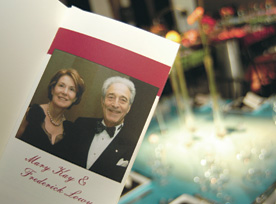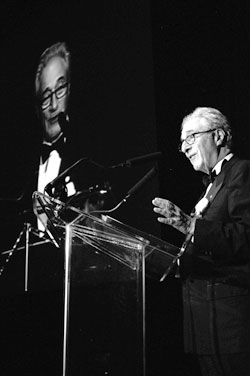$3 million for bursaries marks Lowy sendoff

The invitation to the May 19 tribute dinner for Dr. Lowy
Photo by Luigi d’astolfoj
It was a fitting sendoff for a popular president: affectionate speeches and an elegant dinner attended by friends and family. Best of all, it was crowned by the announcement of a $3-million endowment to provide scholarships for deserving students.
When Frederick H. Lowy arrived at Concordia in 1995, the university was still reeling from the 1992 shootings of four engineering professors, and a damaged reputation and low morale in their aftermath. The start of severe cuts in government funding added to the challenges.
Ten years later, as he concludes his second five-year term as the university’s president, Concordia is thriving, with five new buildings, hundreds of new professors, new programs and solid enrolment. His leadership has set Concordia on course towards a bright future.
Lowy admitted in an interview that when he was first approached about taking on the top job at Concordia just over a decade ago, he was more than a little surprised and not very interested. His background was in medicine. “I said, ‘You’ve got the wrong person. Why me?’ ”
Others, including McGill principal Bernard Shapiro, persuaded him to come to Concordia to have a look. When he did, he liked what he saw.
“I became eager to get the job because I liked the atmosphere, I liked the objectives of the university, and I liked the notion of openness and accessibility and responsiveness to students.”
Uprooting to Montreal came with a lot of personal adjustments, especially for Dr. Lowy’s wife, psychoanalyst Mary Kay O’Neil, who disrupted her practice in Toronto for the move. She had never lived in Quebec before, whereas he had spent formative years here, attending Baron Byng High School on St. Urbain St. and starting his career in psychiatry here in the 1960s.
Budget cuts
His new administration’s first task was to address the substantial budget cuts to Quebec universities.
This was done primarily through early retirement offers to faculty and staff, which enabled the university to rehire strategically when it was able.
As a result, more than 400 new professors have been hired across the faculties, and they have brought new research strengths.
“We’re not yet the best university in Canada,” Lowy said. “I think we are moving gradually, maybe sometimes more rapidly in some areas, towards first-tier status, but there is a lot to be done still.”
His tenure has not been without its troubles, primarily two years of conflict with the Concordia Student Union (CSU).
Student activists engaged in aggressive anti-establishment activities, such as disrupting professional recruiters on campus, which upset students in the business and engineering faculties.
Re-elected to another term, roughly the same CSU executive published a student agenda called Uprising, which offered militant support for radical causes. Many people were offended by its contents.
Then came the protest and violence that prevented former Israeli prime minister Benjamin Netanyahu from speaking at Concordia, an incident that led to the university’s delay last fall of an invitation to speak on campus to another former Israeli prime minister, Ehud Barak, on the grounds of security risks.
“In retrospect, we are all wiser,” Lowy said recently. “We, the administration, did not take a sufficiently strong stand at that time.
However, he maintains that Concordia has had a good decade.
“We have a very devoted group of people in this university and things are really moving in the right direction. There is a lot to be positive about.”
Last Senate
Dr. Lowy attended his last Senate meeting as President on May 29.
At the meeting, he talked of the importance of Senate and its role in developing the core academic mission of the university.
He thanked the academic community for their support. He mentioned significant progress in the quality of academic life, student enrolment, faculty hiring and research in the past 10 years, but that much remained to be done to improve student life and student support.
He concluded that the momentum is there to make Concordia a leading university in Canada.
Needless to say, there was resounding applause.
Friends and colleagues pay tribute to Dr. Lowy

'In retrospect, we are all wiser'
The tribute dinner for outgoing Concordia President Frederick Lowy was held May 19 at the Centre des sciences.
It is a new building in a historic setting, the King Edward Pier adjacent to Place Jacques Cartier. With its glass walls, the large hall offers a clear view all along de la Commune St., and a spectacular view of the Old Port.
At the dinner, a video was shown that began with warm words from Prime Minister Paul Martin, Premier Jean Charest and Mayor Gérald Tremblay, followed by thoughtful remarks from many of Dr. Lowy’s associates at Concordia.
The master of ceremonies was Jonathan Wener, who, with Dominic d’Alessandro, chaired the fundraising committee for the Frederick H. Lowy Scholarships. The guest list for the dinner was made up of the roughly 150 contributors to the endowment. Ten bursaries of $15,000 each will be given each year.
Here are some of the remarks about Dr. Lowy from those who have worked with him closely over the decade:
Lillian Vineberg, member and former chair of the Board of Governors:
“Dr. Lowy allows people to dream, and dreams the dreams into action. He asks a lot of questions, and then he makes a decision that people buy into because they have been part of the process.
“I don’t know anybody who listens as intently as Fred Lowy. When you leave him, you know you’ve been heard."
Jonathan Wener, chair of the Real Estate Planning Committee of the Board: “He has a gentle touch and a strong vision. He was a consensus-builder who took some tough decisions.
“He did a job of empowering the community — the academic community, the lay community, the Board of Governors and the students. With that empowerment he enabled a lot of people to get an awful lot done in a short period of time."
Robert Lacroix, outgoing rector of Université de Montréal:
“Fred est serein, c’est-à-dire, il écoute, il regarde, conçu, il prend le temps avant de prendre une décision. Fred n’a pas un leadership flamboyant. Il a un leadership tranquille, mais un leadership efficace.”
Jack Lightstone, former Provost and Vice-Rector, Research:
“He always boiled down a complex situation to its essence, and was able to communicate that clearly.
“At the core is his conviction that everyone is worthwhile, and I think people respond to that. The university’s strengths are incredibly ahead of where they were a decade ago, and he played a pivotal role in that.”